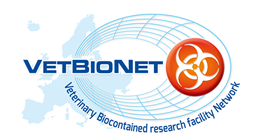E-learning platform
The E-learning platform aims to educate, inform and train technicians and researchers about best practices and ethical issues. The platform also intends to help stakeholders and the public sector to understand the innovations and risks of infectiology experimentation, the best practices, the use of international standards and to illustrate current and likely changes in disease outbreak control.
Best Practice Guidelines and Training
WP3 – Best practices for Biosafety, Biosecurity and Quality Management
VetBioNet works in partnership with the International Veterinary Biosafety Workgroup (IVBW), a 167 members organisation involved in farmed animal high containment from across the world, with a mission to “promote best practice in microbiological biocontainment and safety in veterinary laboratories that have national responsibility for the health of large animals, and which operate at biosafety level 3 and 4. VetBioNet has a page on the IVBW for sharing its outputs on best practice guidance notes.
These guidances cover a wide range of topics and are focused on the specific challenges of running a High Containment Facility for Farmed Animal Species, and currently include:
A link to the site can be found below:
International Veterinary Biosafety Workgroup – Home
Related public deliverables:
Training: IRTA – CReSA Fall Course – Biocontainment & Biosecurity presentations
VetBioNet Final Conference
The VetBioNet final conference took place from 7th to 9th February 2023, in Tours, at the Hotel Oceania L’Univers. In order to have great participation it was organized as a hybrid meeting with both onsite and online participants.
The agenda is visible here.
Webinars and virtual talks
1) EAAP & VetBioNet webinar: Contribution and application of the Zebrafish model to the “One Health” concept
The seventh EAAP Webinar titled Contribution and application of the Zebrafish model to the “One Health” concept has been organized in collaboration with the Horizon 2020 funded project VetBioNet – Veterinary Biocontained research facilities Network.
Maria-Isabel Thoulouze from “INRAE” (France) and VetBioNet Deputy Coordinator chaired the webinar, presenting the VetBioNet project aims and activities with a focus on the Transnational access – TNA call. The first presentation has been given by Christelle Langevin from “INRAE” (France) on “Zebrafish as an in vivo model for biomedical and animal health research”. David Pérez Pascual from “Institut Pasteur” (France) then talked about the “Gnotobiotic zebrafish model for the study of host-microbiota interactions”. Finally, Vincenzo Torraca from the “London School of Hygiene and Tropical Medicine” (UK) made a speech about “Zebrafish Infection: from pathogenesis to cell biology”.
2) 3rd VetBioNet Annual Meeting – Transnational access (TNA)
3) 3rd VetBioNet Annual Meeting – VetBioNet partners research activities related to Covid-19
– SARS-CoV2: One virus, many animals…one model? (Speaker: Saskia Weber, Friedrich-Loeffler-Institut)
– FAQs about SARS-CoV2, and some answers from experiments at Erasmus MC (Speaker: Sander Herfst, Erasmus Medical Centre)
– SARS-CoV2 animal models at WBVR (Speaker: Nora Gerhards, Wageningen BioVeterinary Research)
– SARS-CoV2/COVID-19 work at IRTA-CReSA (Speaker: Julia Vergara-Alert, CReSA)
4) 3rd VetBioNet Annual Meeting – Joint research activities involving private partners
– Telemetric approaches in farmed animal species (Speaker: Lucas Noldus, Noldus Information Technology)
– Development of novel farm animal cell lines (Speaker: Tobias May, InSCREENeX)
VetBioNet partners video presentation
Eurofins-Ingenasa
Eurofins-Ingenasa, a biotechnological company part of VetBioNet, shows us its facilities and the work carried out within the project. The video is available here.
VetBioNet animated videos
1) VetBioNet network is committed to animal health and welfare!
What is the real impact of animal health and welfare on people’s health and daily life? Learn more in this short video produced by the VetBioNet Project!
2) How can VetBioNet improve ethical standards in animal experimentation?
VetBioNet is a collaborative project including high-containment research facilities, academic institutes, international organisations and industry partners. VetBioNet aims at enhancing research on epizootic and zoonotic diseases in many ways, including 3Rs alternatives to animal research: reduction, refinement and replacement.

